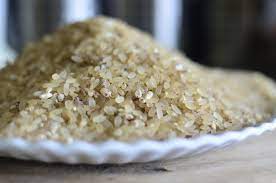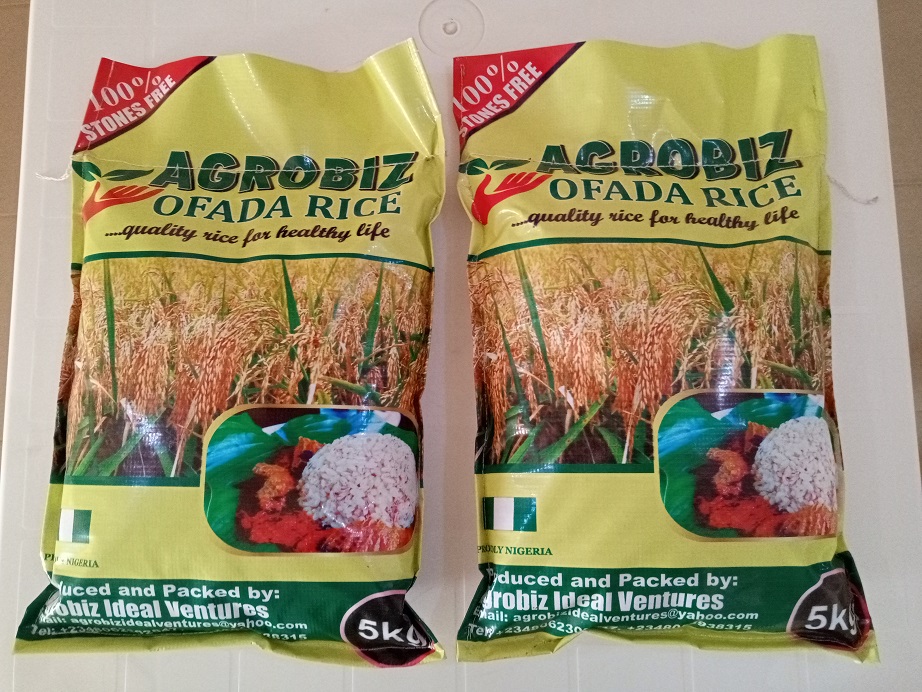HOW TO CREATE THE PERFECT OFADA RICE AND STEW
Ofada stew often referred to as ayamase stew or designer stew, is a delicious stew created in Nigeria with fermented locust beans, bell peppers, and palm oil. For a tasty African keto lunch or supper, serve with cauliflower rice.
The term ofada stew comes from the variety of rice that was initially used to accompany it, called ofada rice. A fragrant kind of rice called ofada is cultivated in some regions of Nigeria. Because some rice bran is still on the grain, it has a richer flavour than normal rice.
The first time I tried ofada rice and stew will always be in my memory. You’ll understand my sentiment if you’ve ever tried it. You don’t readily forget the flavour.
 HOW TO CREATE THE PERFECT OFADA RICE AND STEW
HOW TO CREATE THE PERFECT OFADA RICE AND STEW
HOW TO MAKE OFADA RICE
Ofada rice is known for its dirtiness and stone contents, even though quality has much improved recently. Now that they are offered in little packets, they don’t contain as much filth as they did in the past. In Nigerian homes and events, Ofada Rice is frequently served alongside Ofada Stew/Ayamase.
What do you need?
– 2 cups of Ofada rice
– water
– salt to taste.
- Pick the dirt and stones out of the Ofada rice before cooking. Take caution, as Ofada rice is renowned for being quite filthy and containing many stones.
- Pour the rice into a dish, wash it several times, and examine how filthy the water is.
- Rinse until the water runs clear, add 4 cups of water, and simmer for 12 minutes on low to medium heat. (Don’t cover the pot the entire time.)
- Remove the rice from the heat, rinse the starch off with clean water, then add 1 cup of water and simmer until tender.
To avoid sogginess or burning, you’ll need to check on it periodically. Take it off the fire when it’s soft, and if any liquid remains after the rice has entirely cooked, drain it in a strainer.
Your perfect ofada rice is ready, but you must also consume the stew with it. Here is a recipe for ofada stew.
HOW TO MAKE OFADA STEW
Ofada stew has a taste all its own that is quite seductive. You may find up eating much more than you meant since the flavour is so warm and reviving.
What do you need?
– Green and red bell peppers are two of the ingredients. I’ve had ofada stew cooked with solely red bell peppers as well as with green bell peppers. I like combining the two, but you may combine different elements as you see suitable. or make use of what you already have.
– Palm oil: When bleached, palm oil gives ofada stew its distinctive flavour (more on that later).
– Habanero pepper: Although scotch bonnet peppers are used in the traditional ofada stew, you may also use habaneros.
– Iru (fermented locust beans): When added in modest amounts, iru (fermented locust beans) adds a typical umami taste to Nigerian soups. If you don’t have any on hand, you may skip this.
– Meat: Goat or chicken meat are other options.
– Spices: salt, crushed crayfish, and bouillon powder.
How to bleach Palm Oil
Although bleaching palm oil may seem weird, it is a typical practice in many West African dishes. It entails heating the palm oil till the red tint disappears (and turns a light orange hue).
Why does bleaching palm oil even exist? Because several extremely traditional cuisines rely on bleached palm oil for their distinctive tastes, palm oil is bleached. Without bleaching the oil, you can still prepare the same recipes, but the flavour will be quite different. One of the dishes is this ofada stew.
If you know how to do it properly, bleaching palm oil is pretty simple to do. If done incorrectly, you can have a smouldering kitchen and a shrieking fire alarm!
Pour some palm oil into a saucepan, reduce the heat to low, and then COVER the pot with a lid to bleach it. The final step is crucial because it will stop a kitchen from smoking. Turn on your stove fan if you have one. Additionally, check the ventilation in the kitchen. Then start a timer; you have up to 10 minutes to do it safely. When finished, turn off the heat and let it cool for an additional five minutes before opening the top to avoid splashing.
- Prepare the meat you intend to use first. If using beef, cook it for 30 to 40 minutes until it is soft with salt, beef bouillon, and black pepper. To give the meat a more realistic flavour, you may even cook it. This is something you may choose to do if you want to.
- Bleach the oil as previously described. While you wait, combine the bell peppers and habaneros in a coarse mixture.
- When mixing, use the least amount of water feasible. Pour the combined mixture into a saucepan if it appears a little watery and let it simmer until part of the water has evaporated.
- After cutting the onions, leave them aside. Add onions add to the palm oil along with the mixed peppers and iru (fermented locust beans). For approximately five minutes, cover it and let it simmer.
- Make sure the heat is set to medium and watch it carefully to prevent burning. Add the remaining spices and the meat of your choosing. Add salt as needed after tasting.
- Continue to cook over medium heat for an additional 10 minutes, or until the oil starts to float to the surface.
You may now serve your ofada stew!
TIPS FOR MAKING OFADA STEW
– If the habanero pepper is too spicy for you, cut back on it; if you want it very spicy, add more.
– Bleaching palm oil is not compulsory, however, it will significantly improve flavour.
– Use one variety of pepper, or combine green and bell peppers. Red bell peppers tend to be a little bit sweeter.
Conclusion
Ofada rice is an excellent source of vital nutrients including phosphorus, zinc, and folate, which provide you with energy and support your bones. The greatest way to enjoy ofada rice is with a hearty stew. With the help of this guide, try creating this sumptuous dish; you’ll be pleased you did.
 HOW TO CREATE THE PERFECT OFADA RICE AND STEW
HOW TO CREATE THE PERFECT OFADA RICE AND STEW
To buy your Original destoned Ofada Rice and delivered to you any where is Nigeria Call or whatsapp 0806077920
Price: N6000 for 5kg– you can only request for minimum of 10packs and above.
N55,000 for 50kg
Office for pick up: No 17, community Avenue, ilupeju Magboro, beside Tallmania Hotel, Lagos-Ibadan express way.
Call/WhatsApp 08060779290
read Also:
Ofada Rice Retail Business Plan in Nigeria(Opens in a new browser tab)
A Beginners Guide to Cooking with Ofada Rice
Related